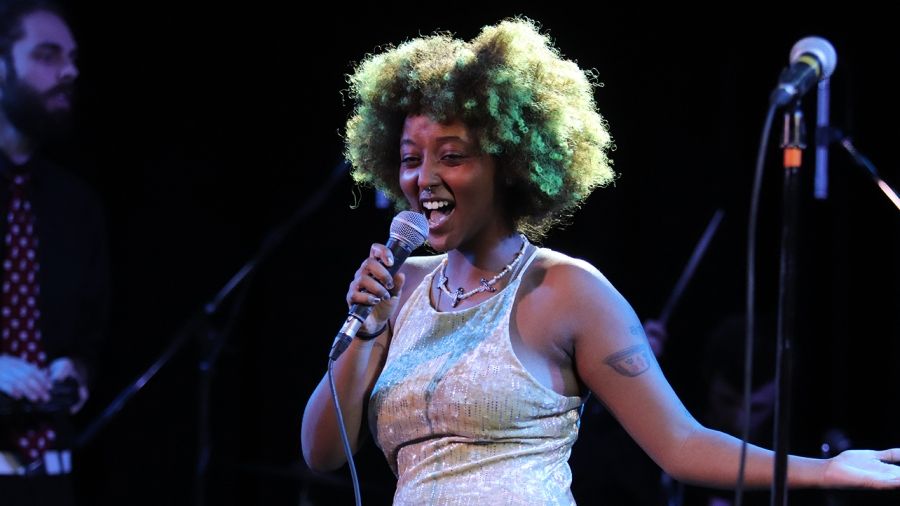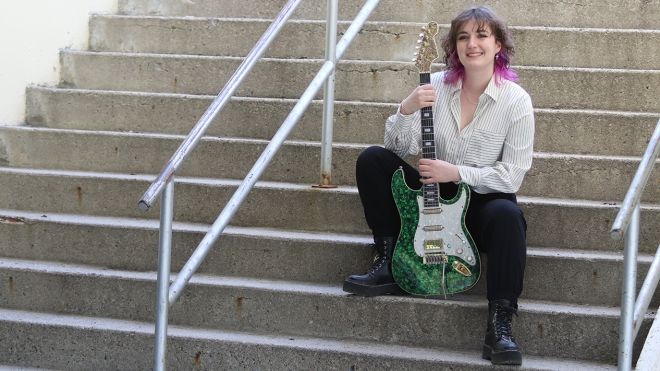Contemporary Music and Technology
Overview
Explore a cross-section of musical genres while you develop the skills you need for a career in the commercial music and entertainment industries!
Train for the Music Industry
Our program has been preparing students for the commercial music and entertainment industry for over 30 years, guided by the principle that the study and practice of contemporary music is the best way to prepare for a successful and rewarding career. It’s one of the only programs in Canada based on the world-renowned Berklee College of Music curriculum.
How Does it Work?
The Contemporary Music & Technology Program is a two-year diploma program. All students take a core first year that provides solid grounding in music theory and ear training. For your second year, choose to major in:
What Will I Study?
The curriculum includes individual and ensemble instruction on guitar, voice, bass, drums, saxophone, violin and keyboards, as well as a solid grounding in music theory and ear training.
The primary styles are rock, blues, jazz, folk and world music. Graduates of jazz and classical programs can learn the technology training and popular music concepts that can help them get career ready.
Develop skills in:
- Performance
- Improvisation
- Songwriting
- Composition
- Film scoring
- Recording
- Live sound mixing
Facilities
Study in professional studios, high-end labs and private practice rooms. We have a total of 18 digital audio workstations on campus, all running the industry standard Pro Tools software and hardware and Sibelius music notation software. Laptops loaded with Ableton Live Suite are available.
Careers
Graduates go on to become performers, recording engineers, composers, songwriters and instructors.
News
Admission Requirements
In addition to meeting the general admission requirements to Selkirk College, applicants to the Contemporary Music and Technology program must meet the following requirements to be considered fully-qualified.
- Completion of Grade 12 or equivalent with a minimum of 60% or higher in English Studies 12
- Successfully pass an audition/interview which consists of:
- Assessment of instrumental ability on an instrument/voice. The instruments that are accepted are: guitar, bass, drums, keyboards, voice, saxophone, trumpet, banjo, mandolin, and violin/fiddle.
- Demonstration of basic music theory proficiency equivalent to the Royal Conservatory Grade II, through a written examination that includes identifying intervals, key signatures and triads in basic music theory equivalent to Royal Conservatory of Music Grade II requirements.
- An Ear Training Test for pitch, triads, rhythmic and melodic diction and interval recognition.
When it is not feasible to do the audition in person alternate arrangements can be made. The theory and Ear Training Test can be sent to the applicant for invigilation by an authorized person and the performance portion can be submitted through approved audio/media material or by providing a link to an online video.
Special Exceptions
Applicants who perform an exceptional audition but who do not meet the theory and ear training standard will be required to attend a two-week theory preparation course in August. The applicant must have a minimum final grade of 75% in both the ear training and the theory sections to be accepted into the Music program for September. Applicants who do not meet the minimum standard in matching pitch will not be accepted into the Music program.
Completed applications (except for the audition) are recommended to be submitted to the Registrar’s office by April 30th prior to the start of the next intake of the program. Applications may be accepted after this date with permission of the school chair. The recommended deadline for completion of the audition process is May 31 prior to the commencement of the program.
Auditions will be arranged by the department when the completed application form and transcripts are completed and received.
Study your instrument and related skills in the first year and choose a major in the second. An initial core year that provides solid grounding in music theory and ear training is followed by one of five program majors.
Students must achieve a cumulative GPA of 2.0 or higher. with no grades below "C-" Specific majors have additional graduation requirements.
Tuition & Fees
All amounts are estimates and are subject to change. Tuition amounts are based on a full-time course load. Please note that many programs have additional costs beyond those listed here. For more information, please visit Tuition & Fees.
Find Out More
We look forward to connecting with you! Fill out this form and we'll reach out to you.





